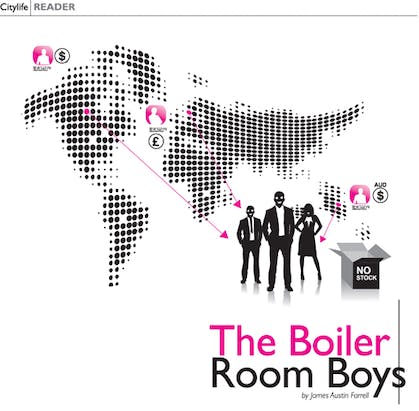
For those unfamiliar with Lee’s past line of work, who may have not seen the cult 2000 Hollywood film ‘Boiler Room’, a boiler room is a company set up to trade stocks, except the stocks being traded are bogus. They don’t exist. It’s a scam. Though to the naiive punter with an impulse to get rich quick the thought of quadrupling an initial investment in a month or two is often too hard to resist. “You find a lot of the time the people who fall for it don’t have a lot of money,” says Lee, “they’re people with a little bit of money who think they can get wealthy fast.”
Bangkok is one of the boiler room capitals of the world. It was said a few years ago that there were as many as 30 extremely profitable boiler rooms in the Thai capital. Set up as investment companies the offices are staffed with pitch men and ‘financial experts’ and management staff, who are all making a tidy sum of money. Many of the cold callers are hired from overseas baited by ‘make a buck abroad’ newspaper ads mostly in the UK, US, and Australia. Prospects will have their flights paid for to the sunny East often unaware of the insidious nature of the job they are about to take on. “Some of them definitely don’t know what is going on,” Lee explains, but adds that he had some knowledge of the more than dubious processes of a boiler room before he started, having known someone on the inside. “It’s all professional,” he says, “you come to work on time, you have training, you dress up smart, have goals and all that. There are clocks with different time zones on the walls…you work with a European time zone, the customers don’t know you’re based in Asia.”
“They really stand out,” Lee says of the boiler room boys clique, “you’ve got to be a bit of an arsehole to do that kind of work. A guy offered me a job when I was in a bar and I knew straight away he was dodgy, but I needed some work. They’re really obvious, flashing their money and what ‘ave you.” He explains that even though their operation is not exactly an impregnable secret to authorities or even journalists, the companies often _ more so in the past _ work with impunity. “They do it here,” he says, “because they can pay bribes. I mean, they tell you to be low-key, which is funny, ‘cos they are far from low key those dodgy *****.”

The ‘traders’, Lee explains, were of different ages, mostly male, and mostly from the US and UK. “Some think it’s legit, it looks like a proper job, but some of the monkeys in there could barely read.” Nevertheless, he adds that the first task in the boiler room is to memorise a pitch, for two or three days you work at perfecting this pitch and are not even allowed out of the office during work hours. He says they were told during these training days, “If there is the slightest hint they are not interested then put the phone down straight away.”
“A lot of people, like a lot you meet in Thailand, have come here and don’t wan to go home, these people get preyed upon,” Lee says. “I spent most of my time phoning my friends. The one call I did make was to a shelf packer in Tesco, he just told me ‘you’re calling the wrong man mate’.”

But they do often get their ‘right’ man; the brain posed in the picture. Their code is the scammer s’ well worn maxim ‘there’s always one fool’ out there. “It’s big money,” Lee says, “really big. Some of them are making 10,000 dollars a day. And they are full of themselves, going into bars, pissed, waving money around. They even pitch to each other when they go out, or go on about how they worked a customer. And they don’t feel bad about what they’re doing. One guy I met had been doing it for eighteen years.”
He explains that with all that money going around the operation is taken very seriously. “People have been killed,” he says, there’s a lot of competition around. We had a security guard in the foyer of the condo.” He also explains how customer service is taken quite seriously, the boiler room is no smash and grab routine, it’s a carefully constructed plot. Buyers receive stock certificates, and are regularly updated after their first purchase, and when they see their stock going up they invest even more money. “They don’t know it’s fake until they cash in, and then it’s too late,” Lee declares, adding emphatically “it’s an horrendous job.”
Lee walked out of his job in the boiler room and never looked back. Though he tells me that he does occasionally, even in Chiang Mai, see boiler rooms boys hanging out in bars. “They stick out,” he says, “they’re always loud, obnoxious, leery. If you ask one of them what they do they’d say ‘work the telephones’ but if you’ve worked in a boiler room, you know what they really do.”
It’s has been reported that many boiler rooms have been closed down over the last ten years in Bangkok due to international pressure. One ‘investment group’ alone was reported to have taken around 200 million dollars just from the Australian ‘market’. It’s thought many boiler rooms got out of the fire in Thailand and opened up shop in the Philippines and Laos, while hundreds of arrests have been made in Bangkok over the last few years. The UK Times reported in 2006 that one Briton had amassed a fortune of 520 million pounds from his South East Asian boiler rooms, the same article explained that the perpetrators often evade all punishment other than deportation for work permit and visa irregularities.
‘Crimes of persuasion’ are prolific these days and don’t just pick on your telephone, but your computer too, where one man’s junk mail is another man’s gold. For every thousand lucky lottery winners, or those fortunate enough to be the recipient of a Nigerian banker’s stashed millions, there is always one who ‘collects’. Another maxim pertaining to money, greed and often lies, is a maxim I heard more than once while growing up in a cynical, but realistic Yorkshire:
“There’s nowt in this life comes for free.”
